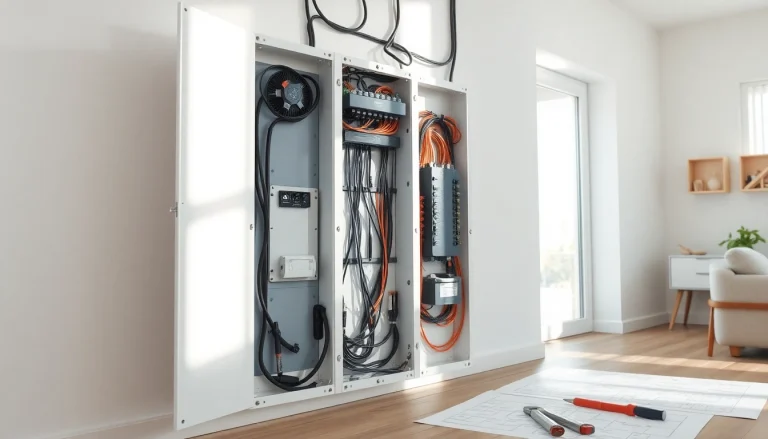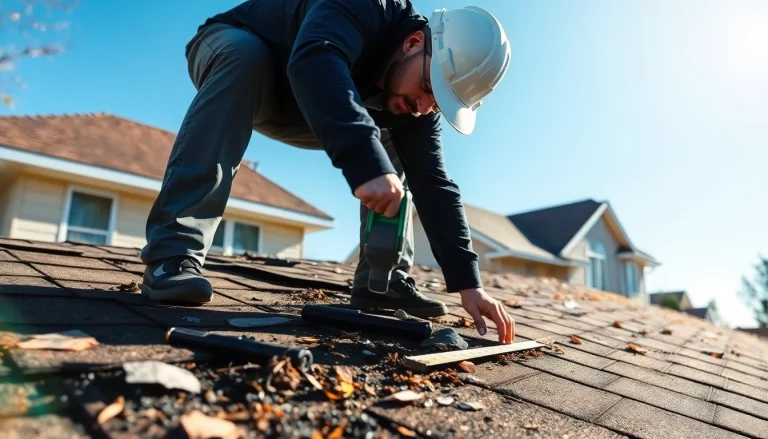
Understanding Home Theater Installation Near Me
Creating a captivating home theater experience begins with understanding what home theater installation near me truly involves. Many homeowners dream of replicating the cinematic experience right in their living rooms or dedicated theater spaces. But what does it entail? Let’s dive into the fundamentals of home theater installation and explore how to navigate this exciting journey.
What is Home Theater Installation?
Home theater installation refers to the setup and integration of audio and visual equipment that allows you to experience movies, music, and other media with exceptional quality. This can range from a simple TV and sound system to a fully immersive cinematic experience featuring projectors, surround sound speakers, and advanced lighting controls. A successful home theater installation encompasses various aspects, such as:
- Design and layout planning
- Selection of appropriate equipment (TVs, projectors, sound systems)
- Integration of smart home technology
- Cabling and wiring considerations
Benefits of Professional Installation
While some individuals may attempt a DIY home theater installation, hiring professionals can significantly enhance the final result. The benefits include:
- Expertise: Professionals bring experience and knowledge of the best equipment and practices to create an optimized home theater environment.
- Time-Saving: A professional installation can be completed much faster than a DIY project, allowing you to enjoy your setup sooner.
- Support: After installation, experts can provide ongoing support, maintenance, and troubleshooting, ensuring everything operates smoothly.
Common Myths About Home Theater Systems
Misconceptions can often prevent people from pursuing their dream home theater. Some of the most common myths include:
- Myth 1: You need a massive budget to create a great home theater.
- Myth 2: DIY installation is as good as professional services.
- Myth 3: Only larger spaces can accommodate a home theater.
Understanding the realities behind these myths can empower you to make informed decisions about your home theater journey.
Choosing the Right Home Theater Equipment
Selecting the right equipment is pivotal in creating a superior home theater experience. Here’s how you can approach this critical phase:
Essential Components for a Home Theater Setup
Every home theater system should include a few key components:
- Display Unit: This could be a large TV or a projector. The choice will affect the overall viewing experience.
- Audio System: High-quality speakers and subwoofers are crucial for immersive sound.
- Receiver: This component connects various audio and video sources and processes sound, enhancing your experience.
- Cables and Connectors: Proper cabling ensures minimal signal loss and optimal performance.
How to Select Audio and Video Equipment
Choosing the right audio and video equipment can be daunting due to the myriad options available. Here’s a guide to help you make informed choices:
- Assess Your Room: The size and acoustics of your space can influence the type of equipment you should purchase.
- Set a Budget: Determine how much you are willing to spend and try to stick to it.
- Research: Look for reviews and comparisons of different brands and models to understand their features and sound quality.
- Listen Before You Buy: If possible, test audio equipment in-store to ensure you find what is suitable for your preferences.
Budgeting for Your Home Theater Installation
Budgeting is critical to ensuring that your home theater project can be completed successfully. An effective budget should allow for:
- Equipment purchases
- Installation costs
- Potential upgrades or accessories
- Future maintenance costs
Plan for unexpected expenses to avoid interruptions in your project. Research various financing options if needed, as many companies offer payment plans to help distribute the cost over time.
Finding Skilled Installers in Your Area
With the equipment chosen and a budget in mind, the next step is to find high-quality installers. Here’s how to locate and evaluate skilled professionals:
How to Evaluate Home Theater Installers
Choosing the right installer can make a significant difference in the quality of your installation. Here are some criteria to consider:
- Licensing and Insurance: Ensure the installer has the necessary certifications and insurance.
- Experience: Look for companies or individuals with a proven track record in home theater installation.
- Portfolio: Request examples of previous work to evaluate their style and creativity.
Questions to Ask Potential Contractors
Interviewing potential installers is essential. Consider asking the following questions:
- What brands do you recommend and why?
- How do you handle unexpected issues that may arise during installation?
- Can you provide references from previous clients?
- What kind of follow-up support do you provide after installation?
Reviews and Recommendations: Making an Informed Choice
Online reviews and personal recommendations can provide insight into the reliability and quality of service from specific installers. Additionally, platforms like Yelp and Google Reviews are great resources to assess customer satisfaction. Don’t underestimate the value of word-of-mouth recommendations from friends or family who have recently completed similar installations.
The Installation Process: Step by Step
The installation process involves several steps that you should anticipate:
Initial Consultation and Planning
The first step in any home theater installation is the initial consultation, where you discuss your requirements, preferences, and budget with the installer. During this phase:
- Review your room’s specifications.
- Determine the type of audio-visual equipment you want.
- Plan the layout, including the position of speakers, TV, and seating.
The Installation Day: What to Expect
On the installation day, a typical workflow includes:
- Setting up and testing the equipment initially to ensure compatibility.
- Installing wiring and components according to the pre-arranged layout.
- Conducting final tests and adjustments to ensure the optimal quality of sound and picture.
- Providing a demonstration to familiarize you with the system’s operation.
Post-Installation Support and Troubleshooting
After installation, most professional services will offer follow-up support. This can involve:
- Setting up regular maintenance sessions to ensure everything remains in top shape.
- Providing troubleshooting services in case any issues arise.
- Advising on further enhancements or technology upgrades in the future.
Enhancing Your Home Theater Experience
Here are some tips for elevating your home theater experience beyond the standard setup:
Smart Home Integration with Your Theater
Integrating your home theater with smart technology can enhance functionality, such as:
- Using smart lighting to create the perfect ambiance.
- Implementing smart home security and automation systems for added convenience and safety.
- Remote control capabilities via smartphones or voice assistants for easy access.
Maintaining Optimal Audio and Visual Quality
To keep your system performing at its best, adhere to these maintenance tips:
- Regularly clean equipment to prevent dust accumulation.
- Check wiring and connections monthly for issues.
- Keep software updated to ensure all components function with the latest features and security.
Future Trends in Home Theater Technology
Staying ahead in home theater technology means looking out for the latest trends, such as:
- Enhanced 8K display technology for superior visual quality.
- Wireless audio solutions that eliminate cable clutter.
- Artificial intelligence applications that learn user preferences and automate settings for optimal performance.
By staying updated on technology trends, you can ensure your home theater remains cutting-edge and continues to provide enjoyable experiences for years to come.





